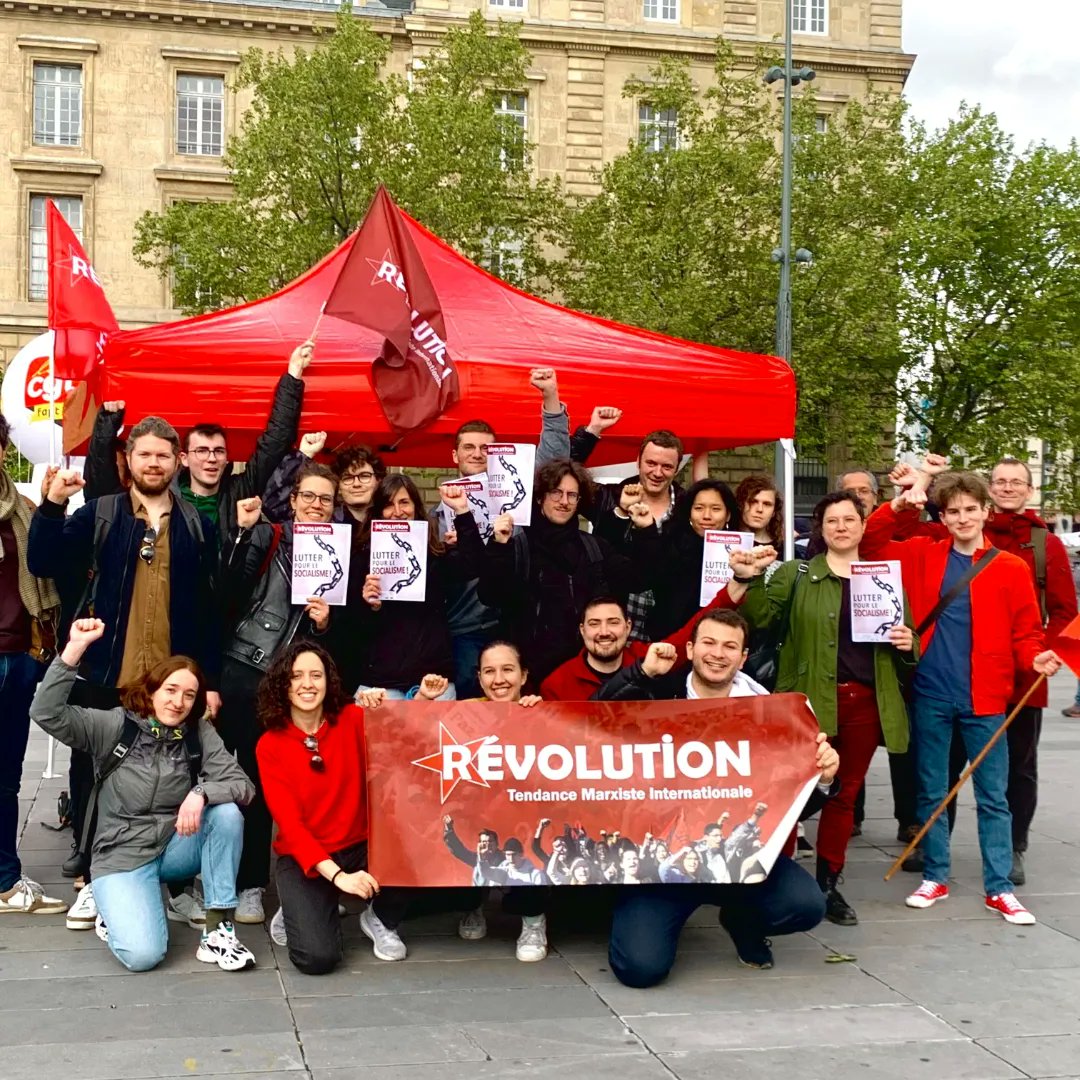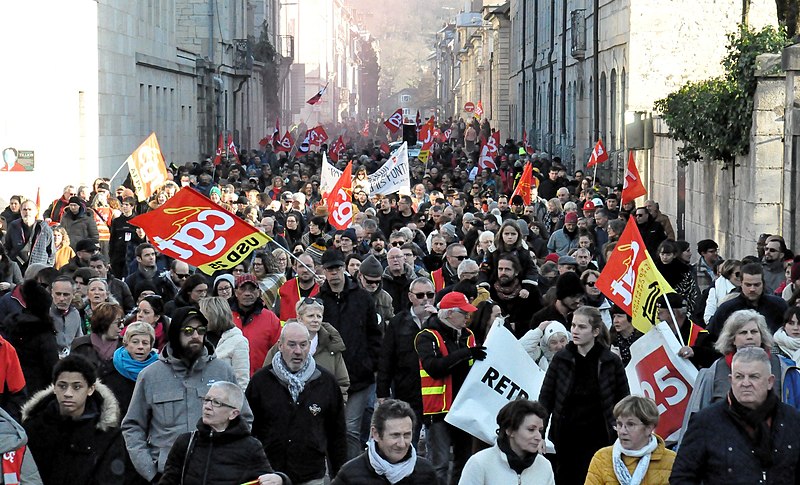Our Brazilian organisation (Esquerda Marxista) recently sat down for a discussion with Jérôme Métellus, leading member of Révolution (the IMT in France), about the powerful movement of strikes and protests that rocked French society starting in January. This struggle, triggered by Macron attempting to hike the retirement age, has entered into a phase of stagnation, but the situation in France is more polarised and enraged than ever.
Esquerda Marxista: We have followed with great interest the large demonstrations and strikes that have taken place in France in recent months. Can you explain to our readers the main factors that led to the current situation?
Jérôme Métellus: The immediate cause of this movement was the pension reform imposed by the Macron government, which pushed the retirement age up from 62 to 64. But of course, what we’ve seen since 19 January is a profound expression of the general discontent towards inflation, dislocation of the public services, attacks on civil servants, deteriorating working conditions – and the consequences of all the counter-reforms of the last two decades.
This movement must be seen in the context of the general crisis of French capitalism and the rising tide of class struggle, which has expressed itself in a series of mass movements since 2003, including the pivotal pension reform strikes in 2010. The Yellow Vest movement of 2018-19 was part of this general tendency.
EM: We saw that the youth also joined the movement nationally, even though the cause of the demonstrations was the raising of the retirement age. Why have young people shown such solidarity with workers striking against the government?
JM: Solidarity with workers is a well-established tradition in the student movement in France. May ‘68 left a profound mark in that respect. But if we look closely at the mobilisation of university and high-school students in these protests, it must be said that it was still relatively small, until Macron’s use of Article 49.3 of the constitution to force through the pension reforms without a parliamentary vote. That is not surprising at all – the youth was not ready to mobilise solely on the question of pension reform. This slogan was too narrow in the context of a general crisis of capitalism.
In that respect, it is significant that a larger fraction of the youth mobilised when the government imposed the counter-reform through Article 49.3. It was this anti-democratic manoeuvre by Macron that convinced them to take to the streets. And of course, behind the democratic slogans, the youth really came out against the whole regime itself. If the leadership of the trade-unions had reflected this mood, the whole struggle could have taken a much more radical and explosive route. But this is precisely why these leaders did not reflect this mood – they were terrified by the spontaneous movement of the youth.
EM: We have recently seen the strengthening of an opposition in the French unions that is proposing a more militant path forward. How has this process of radicalisation taken place among the workers?
JM: The recent Congress of the CGT – which is the most militant and radical confederation of trade unions – marked a spectacular turning point in its history. The left wing was stronger and on a more offensive footing than ever, even if the right wing managed to retain control of the leadership. For example, the outgoing leadership’s ‘Activity Report’ – the document detailing its balance sheet of recent events – was rejected by 50.3 percent of the vote. This is without precedent.
The rejection of the leadership’s report was a confirmation of the fact that, with the exception of the fight against the ‘First Employment Contract’ in 2006, the CGT has only known defeats at the national level for the past 20 years. The internal polarisation of the CGT will not end anytime soon. On the contrary, it will intensify in the months and years to come, as it is a consequence of the growing class polarisation in society at large. The left wing of the CGT – called ‘Unité CGT’ – is getting more and more organised.
Ahead of the Congress, Unité CGT supported a much more radical alternative to the outgoing leadership’s Policy Document. They defended the idea of a “dual task” facing the CGT, which “requires working on a daily basis to improve the lives of workers (working hours, wages, working conditions, etc.) and, at the same time, linking this struggle to the emancipation of workers, through the expropriation of the capitalists.” This is a very positive development, despite the limitations of this left-wing opposition, which despite everything still has a reformist character.
EM: How has Révolution, the French section of the International Marxist Tendency (IMT), been involved in this movement of political radicalisation in France?
 We need to fight for a much broader and more radical programme / Image: Révolution
We need to fight for a much broader and more radical programme / Image: Révolution
JM: We have published five issues of our paper, explaining our analysis of the movement. We sold thousands of copies on the 13 demonstrations that have taken place since January. We intervened in the General Assemblies that took place on the campuses, explaining our position, namely that on its own, the slogan of repealing the pension reform is insufficient.
To encourage the mobilisation of new layers of young people and workers, we need to fight for a much broader and more radical programme. What is needed is a programme that opens up the prospect of putting an end to the problems of the overwhelming majority of the population. This programme must also be linked to the objective of bringing down Macron and his clique.
On the other hand, large demonstrations alone are also not enough. If we want to win, well-organised, indefinite strikes will have to develop in a growing number of sectors. This is precisely what has been lacking in recent months: the sectors that mobilised in large numbers have remained isolated. This is not the fault of the workers, but of the leadership of the trade unions, which has done absolutely nothing to try to develop the movement of indefinite strikes.
Our arguments were warmly welcomed by the students.
EM: What was the character of the 1 May demonstrations this year in Paris and in the cities where the movement against the government has been strongest?
JM: With more than two million people on the streets nationally, these were the biggest 1 May demonstrations since 2002, when Jean-Marie Le Pen (Marine Le Pen’s father) went through to the second round of the presidential election. This was yet another confirmation of the explosive mood that is developing in France.
EM: Where is the protest movement going and what do you think is necessary for it to be victorious?
JM: The indefinite strikes are over. The trade union leaders have done everything they could to control the movement – and force it into a dead end. As a result, the government seems to be victorious. But this would really be a Pyrrhic victory. Macron is weaker than ever, he doesn’t have a majority in parliament and the mood is more explosive than ever, with inflation constantly fuelling the anger of the masses. The whole situation could change in the space of 24 hours – and transform itself into a new May 68.

